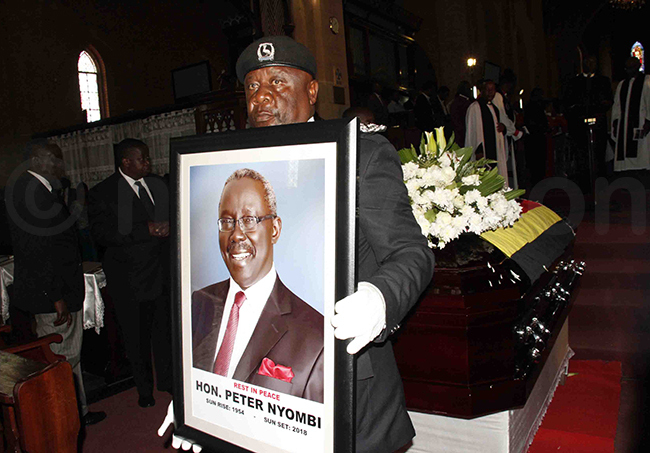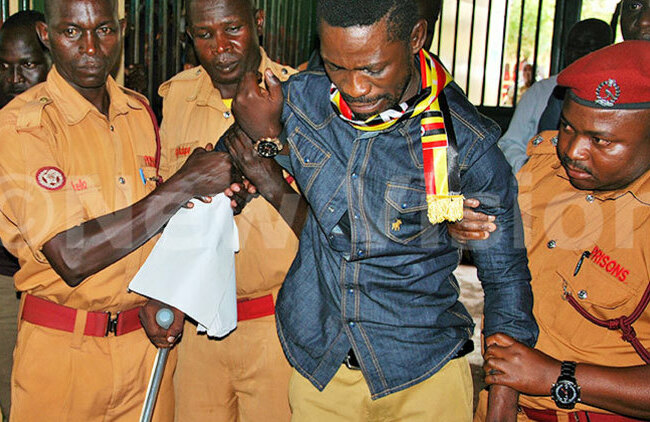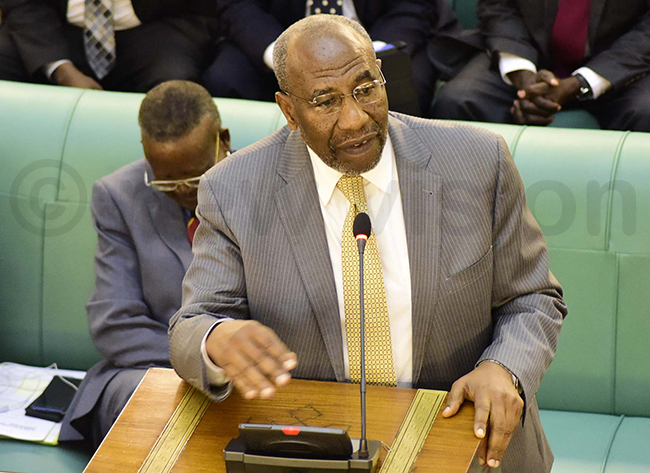How Parliament, executive wrangles threaten service delivery
Kadaga faulted the Government chief whip, Ruth Nankabirwa for saying that Parliament could not pay tribute to Nyombi because the Speaker and her deputy Jacob Oulanyah were away.
Speaker of Parliament, Rebecca Kadaga. Photo/File
Clashes between Parliament and executive, which have become rampant lately, are threatening to hurt the working relationship of the two arms of government, damaging their ability to offer services to Ugandans.
In the latest "clash", a section of MPs led by Ngora County legislator, David Abara and Nwoya County MP, Simon Oyet last week stated collecting signatures to recall Parliament from recesses to debate the army's brutality against civilians.
The MPs are responding to an incident in which a group of armed men brutally arrested a civilian, Yusufu Kawooya in broad day light.
During Kawoya's arrest that was recorded on camera, the armed men hit him with gun butts in the waist as he pleaded for mercy and help from startled onlookers.
Since the incident happened, no line minister came out to condemn it.
However, the scene sparked off public anger, resulting into condemnation of the security forces over the brutality.
The MPs' move to collect signatures and later recall Parliament is seen as yet another clash pitting Parliament against the executive, which has powers to prevail over the army.
This clash comes at the heels of another one between the two organs, which happened recently when MPs failed to turn up for a Parliamentary session to honour former attorney general, Peter Nyombi who passed on.
Whereas the executive took Nyombi's body to Parliament on a Thursday, there was no Parliamentary business.
Sources said MPs, who were on recess, refused to return for the session. The Speaker of Parliament, Rebecca Kadaga later wrote a stinging letter, clarifying on the matter.
She faulted the Government chief whip, Ruth Nankabirwa for saying that Parliament could not pay tribute to Nyombi because the Speaker and her deputy Jacob Oulanyah were away.
"The remarks attributed to Hon. Nankabirwa are far from the truth and unfortunately, have been picked by the mainstream media," Kadaga said.

A portrait of late Nyombi during his funeral service and Namirembe Cathedral in Kampala
Clash over Mobile money tax
The process that preceded the recent vote on the Excise Duty (Amendment) (No.2) bill that reduced Mobile Money tax from 1% to 0.5% last month also underscored the disagreement between Parliament and executive.
Until it was finally passed, Parliament had failed to conduct the vote even when it was clear that the executive supported it.
During the process, there were clear signs that a big number of MPs favoured the minority report of the finance committee, which was against reducing the tax.
The minority report presented by MP, Patrick Isiagi implored the house to scrap the tax in totality instead of reducing it.
State Minister for Finance, David Bahati laboured to explain why the tax was important for the economy, but his explanations fell on MPs deaf ears.
Little wonder that dozens of MPs were absent when the vote on the tax was finally conducted early last month. The two institutions appeared to have been reading from different hymn books on the matter.
In the same month, the Speaker of Parliament, Rebecca Kadaga suspended the house after the executive failed to explain the army's brutality on the lake.
Kadaga said that although the matter had on several occasions been tabled before the house, no line minister had come up with answers to the queries.
Torture of Bobi Wine, other MPs
The executive and Parliament had also earlier clashed in the August after the Arua violence in which some MPs including Bobi Wine aka Robert Kyagulanyi of the Kyadondo East were arrested and tortured by the army.
Whereas, most ministers blamed Bobi Wine's group for instigating the chaos during which President Yoweri Museveni's motorcade was allegedly stoned and a windscreen smashed, resulting into the mayhem, Parliament denounced the torture and arrest of MPs and civilians.
Kadaga sent a letter to President Museveni asking him to punish security officers especially the military who participated in the alleged torture during the Arua Municipality byelections.
"Your excellence, I am concerned that no effort has been made to arrest the security officers from SFG, military police and Uganda Police Force, who were involved in the violent actions against unarmed civilians," the letter read in part. To date no such action has been done.
 Hon. Robert Kyagulanyi aka Bobi Wine being help out of court by prison wardens. Photo/File
Hon. Robert Kyagulanyi aka Bobi Wine being help out of court by prison wardens. Photo/File
However, Museveni on August 31 responded to Kadaga, observing that security forces are allowed to use reasonable force in handling certain situations and in execution of their mandate to protect civilians.
In December, Kadaga also wrote to President Museveni wondering how security officers could sneak into Parliament which prompted a fight on the floor.
The fight happened as MPs debated the bill on lifting the Presidential age limit. The fight saw MPs battered like chicken thieves by army men inside Parliament. But the clashes are not happening without a cost on service delivery.
Parliament responds
Without confirming or denying that a clash exists between the two arms of government, Parliament's director of communication, Chris Obore told New Vision he would advocate for debate instead of clashes between the two arms of government.
"Parliament, executive and judiciary constitute what is called government. In all our operations, service to citizens should be the goal and there is a concept of separation of power, meaning that there should be minimum interference in the execution of work. But this is not detachment of the arms. We must coordinate and cooperate not compete," Obore said.
Cost of the clash
Dr. Meshach Katusiimeh, a Senior lecturer of leadership at Cavendish University says the clash is very clear and in bold letters. He noted that there is no mutual respect between Parliament and the executive.
"The President was quoted recently to have said that Parliament is useless. So do you expect the executive to respect Parliament after the President has said so?" Katusiimeh wondered. "But what if the Speaker had answered back to the President in the same tone?"
He also noted that the speaker overreacts out of frustration. "She wants to show that Parliament is serious but the ministers are frustrating her by going to their constituencies to mobilise voters ahead of the 2021 elections instead of attending to Parliamentary business. She has no option but to raise her voice," Katusiimeh said.
He added that the clash has a serious impact on service delivery because it means there are delays and that executive will not be able to implement certain policies which are not certified by the executive leading to stalemate.
Katusiimeh added that for the two institutions to work in harmony, the Speaker and President must always consult before serious business is brought to the floor of Parliament.
"The President and Speaker should always have a one on one discussion on crucial matters and advise each another on the way forward before the debates," he said.
Economic implications
Dr. Fred Muhumuza, a financial expert who worked for Ministry of Finance for years told Saturday Vision that whereas the impact of the clash between the legislature and executive to the economy may appear indirect, it is very serious.
"These are key institutions and genuine investors use their working relations to test the investment environment before bringing their money into the economy," Muhumuza said.
"Genuine investors want to see harmony, and I have met quite a number of them, who are concerned about the clash which is harmful to the investment environment."
Muhumuza added that the clashes may be the reason foreign direct investment is declining contrary to the assumption government had that after tarmacking the roads, the number of investors would increase.
"I have even been reading a report on foreign direct investment in Africa that says that foreign direct investments have plummeted from $74bn to$41bn," he said. "You have to ask what has befallen Africa."
Muhumuza also noted that typical investors want security for their investments.
Government speak out
But Government spokesperson, Ofwono Opondo says what is happening between the two arms of government is not a clash but that "Parliament is exercising is roles as mandated by law."
Opondo noted that the Speaker of Parliament has not only written to President Museveni over a controversy but also to the judiciary in the name of checking other arms of government.
"You remember when the speaker wrote to the judiciary over the bogus orders that had been issued," Opondo said, adding, "This can happen because there are structured forums in place for the speaker to do so."
He added that the fact that the President continues to make the state of nation addresses in Parliament is proof of a good working relationship between the two arms.
"Whenever need arises, the President asks the speaker to address Parliament and she has had no problem with the requests," he said.
About the suspension of the business of Parliament by the speaker when ministers fail to turn up to the house like it happened recently after the executive's failure to explain the army brutality on the lake, Opondo said the speaker commits no crime.
 The Leader of Government Business, Rt Hon. Ruhakana Rugunda making a point on the flour of Parliament
The Leader of Government Business, Rt Hon. Ruhakana Rugunda making a point on the flour of Parliament
"Business in Parliament comes from the executive and when the ministers are not punctual or fail to perform their duties, the speaker can say enough is enough and she suspends Parliament to send a signal to the President that some of his ministers are not serious," he said.
Former Makindye West MP Hussein Kyanjo also weighed, arguing that the clash only exists in an illusion to hoodwink the public but that there is nothing much happening.
"There happens in Uganda without the knowledge of the Speaker and the President so how they respond to what has happened is politics," Kyanjo added.
He also noted that the speaker over-reacted on the army brutality against fishermen on the fishing grounds because her constituents were among the victims. "This problem has been around for some time in other areas but she was not doing anything," Kyanjo said.
RELATED TO THE STORY